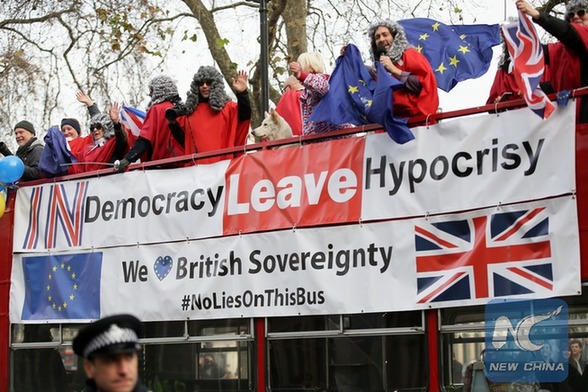Brexit effect feeds through to UK inflation figures

A bus carrying demonstrators drives past the Supreme Court in London, Britain on Dec. 5, 2016. [Xinhua/Tim Ireland]
UK consumer price inflation rose to its highest mark in more than two years, according to figures released on Tuesday, as the effects of a sharp depreciation in sterling following the Brexit vote begin to be felt in prices.
The CPI rate rose from 0.9 percent in October to 1.2 percent in November, slightly more than experts expected and reversing the fall of 0.1 percentage points seen from September to October, according to figures from the Office of National Statistics (ONS).
Weak sterling is a key reason behind this sudden spike in inflation.
The Brexit referendum vote on June 23 led to an immediate and sharp fall in sterling on foreign exchange markets, reflected in the collapse of the pound against the dollar from 1.48 U.S. dollars to the pound on the night of the vote to 1.27 U.S. dollars now.
The pound has reached a low point, very briefly, 1.18 U.S. dollars since June 24.
The weakness of sterling has a double-edged effect -- making exports cheaper but also making imports more expensive.
With many commodities priced in the U.S. dollars, the increased costs for UK manufacturers and retailers is now feeding through.
"While it will take time before we see the full effects of sterling's fall on consumer prices, components that usually respond more quickly to exchange rate movements, such as petrol and food prices, were a major upward influence in November," said Ruth Gregory, UK economist with Capital Economics, a financial market analysis firm.
"There were reports that prices of IT equipment -- typically priced in U.S. dollars -- had been affected by the exchange rate too," Gregory added.
In addition, clothing prices hit the highest monthly increase for this time of year since 2010, reflecting in part the large part that imports play in the clothing market.
Price pressure is being felt at the beginning of the supply chain now, said Gregory, with producer input price inflation at 12.9 percent, a five-year high.
BANK RATE TO STAY LOW
The Bank of England's (BOE) bank-rate setting Monetary Policy Committee (MPC) holds its December meeting on Wednesday and Thursday this week and the increase in inflation will be discussed.
The BOE expects inflation to reach 2.7 percent by the end of 2017, some way above its target of 2 percent.
But experts do not expect that this rise in inflation is going to spur the MPC into a second rate cut this year, having cut by 25 basis points in August in a response to expected financial and economic difficulties in the wake of the Brexit vote.
"We still think the BOE will look through this exchange-rate driven spike in inflation, even if it proves to be a bigger spike than it is currently expecting. But for consumers seeing only sluggish pay growth, it is bad news," said Elizabeth Martins, economist at HSBC in London.
The BOE will interpret this sudden spike, and the likely rise of inflation through 2017, as driven largely by the weakness of sterling, despite its recent strengthening of 6.5 percent on a trade-weighted basis since mid-October.
For this reason, the BOE will see the inflation rise as temporary, and not a structural problem which would demand firm action.

























